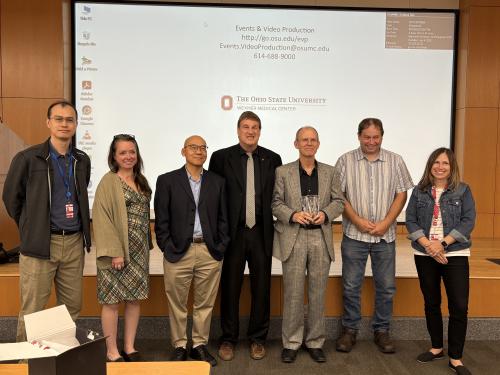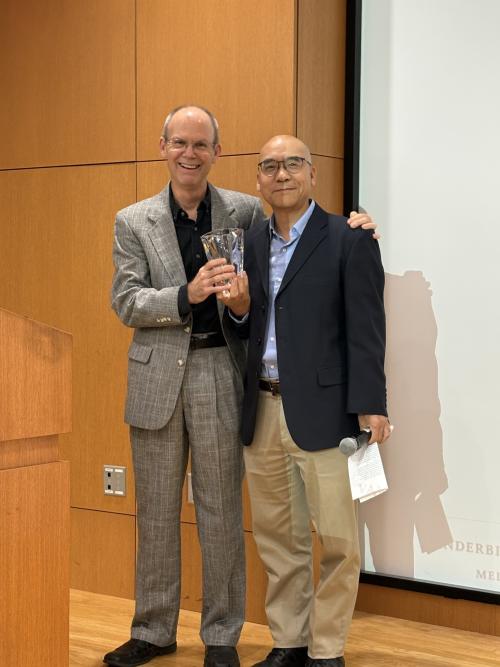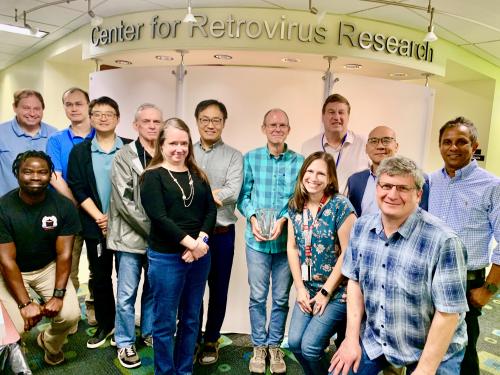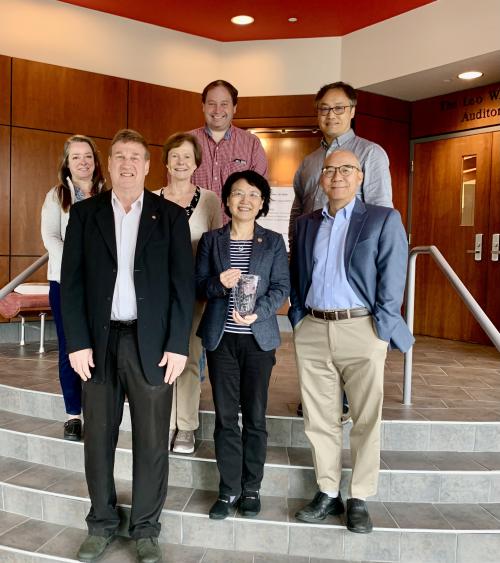Awardees
Dr. Christopher Aiken is Professor of Pathology, Microbiology and Immunology at Vanderbilt University Medical Center. He completed undergraduate studies in Chemistry at the University of California Santa Barbara and earned a Ph.D. degree in Biochemistry from the University of Illinois. Before joining Vanderbilt University in 1995, Dr. Aiken worked as a post-doctoral fellow at the Salk Institute for Biological Studies, La Jolla, California under the direction of Dr. Didier Trono.
Dr. Aiken’s group has made key contributions to two important research areas: the structure and function of the HIV-1 capsid and the antiviral mechanisms of small molecules targeting the HIV 1 Gag proteins. His team pioneered the purification of native mature viral core particles from HIV-1 virions (2000), then developed methods to quantitatively analyze the effects of mutations on the stability of the viral capsid. This groundbreaking work led to the conclusion that the capsid performs key roles in both reverse transcription and nuclear entry of the virus (2002). In collaborative work with numerous structural biologists, Aiken’s group helped define the intersubunit interfaces that determine the optimal stability of the HIV-1 capsid (2009, 2013). Working with Itay Rousso, Aiken’s team helped show that HIV-1 nuclear entry is critically dependent on the elasticity of the viral capsid and that the capsid-targeting antiviral compounds PF74 and Lenacapavir act by reducing HIV-1 capsid elasticity (2024, 2025). His group also performed early studies of the antiviral compound bevirimat, showing that it binds specifically to the immature HIV-1 Gag lattice and inhibits the cleavage of a specific site in Gag, thereby inhibiting maturation (2004).
Dr. Aiken has successfully mentored 13 Ph.D. students and 15 postdoctoral fellows. He served as Director of the Vanderbilt Microbiology and Immunology Ph.D. program from 2006-2021. He collaborates widely with members of the HIV research community and has been continuously funded by the NIH since 1998.
Dr. Aiken is an elected Fellow of the American Association for the Advancement of Science and an American Academy for Microbiology Fellow. In 2013 he received the Ernest W. Goodpasture Research Award by Vanderbilt, and in 2015 he was awarded the Cornelius Vanderbilt Chair in Pathology, Microbiology and Immunology.
Dr .Aiken was selected by the Center for Retrovirus Research of The Ohio State University to receive the 2025 Distinguished Research Career Award in recognition of his seminal contributions to the field of retroviruses including our understanding of structure/function of the HIV capsid. Dr. Aiken’s keynote seminar was entitled, " The HIV-1 capsid: A lynchpin target for therapy".
Dr. Peijun Zhang is a Professor of Structural Biology in the Nuffield Department of Medicine at the University of Oxford and the founding director of eBIC (the UK National Electron Bio-imaging Centre) at the Diamond Light Source. She completed her undergraduate studies in Electrical Engineering and her Master’s in Condensed Matter Physics at Nanjing University, China. Dr. Zhang earned her Ph.D. in Molecular Physiology and Biophysics from the University of Virginia. Before joining the University of Oxford and Diamond Light Source in 2016, Dr. Zhang was a post-doctoral fellow and staff scientist at the National Cancer Institute, National Institutes of Health. She began her faculty career in the Department of Structural Biology at the University of Pittsburgh in 2006.
Dr. Zhang has made outstanding contributions in two key areas: the advancement of in-situ structural biology techniques
and the understanding of human virus infections, particularly HIV-1. Her pioneering work on the HIV-1 capsid structure began with her high-resolution characterization of HIV-1 capsid assemblies using a hybrid cryoEM and NMR approach (2009). This research unveiled a novel inter-molecular interface critical for capsid function and a key docking site for host factors. Using an innovative combination of cryoEM, cryoET, and all-atom MD simulation, Dr. Zhang developed the complete atomic model of the native HIV-1 capsid (2013). This groundbreaking 4-million-atom structure has provided a vital platform for studying HIV-1 capsid function, host cell interactions, and developing therapeutic strategies to treat and prevent HIV-1 infection. Her subsequent studies elucidated how the host factor cyclophilin A and the small molecule PF74 (a Lenacapavir precursor) interact with the HIV-1 capsid lattice, affecting HIV-1 infectivity (2016, 2020). Most recently, her work has highlighted the interplay between the capsid and host restriction factors, such as MxB and Trim 5α, and the role of the small molecule IP6 (2017, 2021).
Dr. Zhang has been a trailblazer in developing novel methods for in-situ structural biology, including correlative microscopy to study rare and dynamic processes such as HIV-1 infection. Her development of in-cell techniques has enabled the capture of authentic cellular processes and virus assembly intermediates, with notable applications to SARS-CoV-2 infection, cytopathy, and COVID-19 vaccines (2021). Her innovative approaches are leading a new era in in-situ structural biology, exemplified by her recent work on resolving in-situ chromatin fiber and nucleosome structures in intact native T-lymphocytes.
A prolific author, Dr. Zhang has published extensively in leading scientific journals and has received numerous accolades, including the Senior Vice Chancellor’s Award from the University of Pittsburgh (2007), the Carnegie Science Emerging Female Scientist Award (2014), and the Wellcome Trust Investigator Award (2017). In 2024, she was elected as a member of EMBO. As a dedicated mentor, Dr. Zhang has trained over 30 graduate students and postdoctoral fellows, many of whom now hold independent positions in academia and industry.
Dr. Zhang was selected by the Center for Retrovirus Research of The Ohio State University to receive the 2024 Distinguished Research Career Award in recognition of her seminal contributions to the field of retroviruses including our understanding of structure/function of the HIV capsid. Dr. Zhang’s keynote seminar was entitled, " In situ structural biology of virus infection and vaccine".
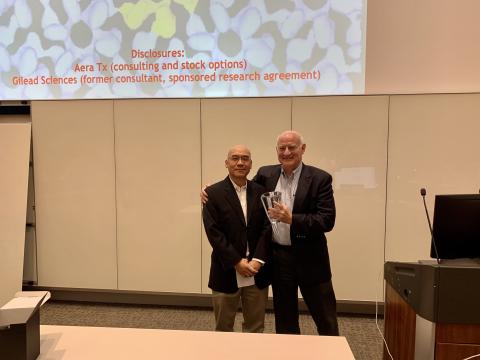
Dr. Wesley Sundquist is the Samuels Professor and Chair of Biochemistry at the University of Utah School of Medicine. He graduated from Carleton College, Northfield, Minnesota with a degree in Chemistry and from Massachusetts Institute of Technology with a PhD in chemistry mentored by Dr. Steve Lippard. Dr. Sundquist then did his postdoctoral training at the MRC Laboratory of Molecular Biology, in Cambridge, England with Dr. Aaron Klug, before joining the faculty in the Department of Biochemistry at the University of Utah in 1992.
Dr. Sundquist has made many significant contributions to the field of molecular and structural biology of retroviruses, in particularly HIV. He used integrated approaches by combining structural and functional analysis to develop the fullerene cone model of the HIV-1 capsid, which explains intrinsic architectural principles of retroviruses. He was the first to report the crystal structure of the HIV MA protein as well as the 3D structure of the N-terminal domain of the HIV-1 CA protein (1996). He then demonstrated HIV-1 capsids belong to a family of geometric objects comprising extended hexagonal lattices and 12 pentagons, called fullerene cones (1999). In 2001, Dr. Sundquist discovered that HIV-1 budding is achieved by recruitment of the ESCRT pathway, and then identified components of this pathway in humans, and determined structures and mechanisms of pathway proteins. Recently, Dr. Sundquist has applied emerging paradigms for enveloped virus assembly to the design and characterization of new proteins that can assemble into nanocages, bud from mammalian cells, and carry cargoes into new target cells. In 2020, he described the reconstitution of HIV-1 reverse transcription initiation, double-strand DNA synthesis, and target integration of the HIV-1 genome in a cell free system, starting with purified viral capsids. Dr. Sundquist’s research continues to focus on understanding the architecture and assembly of the retroviral particles, the mechanisms of intrinsic host cell defenses, and the process of virus budding using state-of-the-art approaches including NMR, EM, and crystallographic studies.
Dr. Sundquist has published numerous papers in leading scientific journals including Cell, Nature, PNAS, and Science. He is an editor or on the editorial board of many journals, including eLife. Over the years, he has received many awards, including Searle Scholars Award, the ASBMB Amgen Award for the Application of Biochemistry and Molecular Biology to the Understanding of Disease, the Bernard Fields Award for Retrovirology, and a Distinguished Alumnus Award from Carleton College. He was elected to the American Academy of Arts and Sciences in 2011 and the National Academy of Science in 2014. Dr. Sundquist was also named as University Distinguished Professor, and won the prestigious Rosenblatt Award for Excellence from the University of Utah in 2017.
As an effective mentor, Sundquist has trained more than 40 graduate students and postdocs, many of whom currently hold independent positions in academic and private-sector institutions.
Dr. Sundquist was selected by the Center for Retrovirus Research of The Ohio State University to receive the 2023 Distinguished Research Career Award in recognition of his seminal contributions to the field of retroviruses including our understanding of structure/function of the HIV capsid. Dr. Sundquist’s keynote seminar was entitled, "Structure and Function of the HIV Capsid."
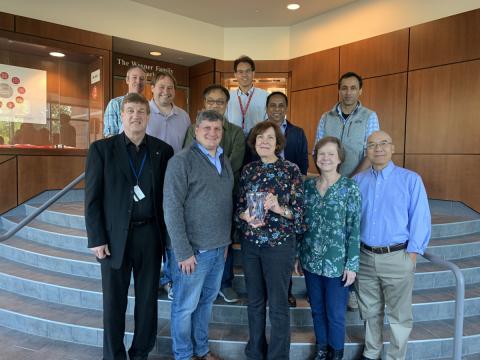
Dr. Kathleen Boris-Lawrie earned her B.S. and M.S. in microbiology from Southern Illinois University and Ph.D. in Molecular Genetics from George Washington University School of Medicine (1991). Her dissertation on HIV-1 transcription was carried out with Dr. Ajit Kumar in collaboration with Dr. John Brady at the National Cancer Institute, NIH. Next, she joined the laboratory of Dr. Howard Temin, 1975 Nobel Laureate in Medicine or Physiology, at the University of Wisconsin. During her postdoc training, Dr. Boris-Lawrie invented novel structural gene vectors covered by US patents and replication-defective vaccine vectors that lacked pathogenicity and protected against challenge with parental virus in animal models. In 1996, Dr. Boris-Lawrie joined the faculty of the Departments of Veterinary Biosciences and Molecular Virology, Immunology & Medical Genetics at The Ohio State University (OSU). She was promoted to Associate Professor (2001) and Professor (2005). Dr. Boris Lawrie was the founding Executive Director of the OSU Life Sciences Network from 2012-2015. In 2015, she moved to the Department of Veterinary & Biomedical Sciences at the University of Minnesota, where she served as Department Chair (2015-2020).
Dr. Boris-Lawrie’s research is focused on unraveling genetic, biochemical and biophysical properties of the viral RNA-host protein interactions that promote or restrict viral infection. In ground-breaking work, Dr. Boris-Lawrie discovered a new class of post-transcriptional control element (PCE) in retroviruses and select host mRNAs. Her research identified PCE structure- dependent binding of nuclear RNA helicase A/DHX9 is necessary for translation of virion proteins and cancer-associated host transcription factors. Her studies characterized a novel cap-binding complex that cells use to overcome global translation inhibition, resolving the long-standing question of how protein synthesis is maintained during inhibition of mTOR. She showed that a hypermethylated cap structure of HIV-1 mRNA licenses its specialized translation pathway.
Dr. Boris-Lawrie has graduated 10 Ph.D. and 4 M.S. degree students and mentored 9 postdoctoral trainees who now hold scientific positions in the academy, government, and industry. Together with her mentees and collaborators, she has published 70 primary research articles, reviews and book chapters.
Dr. Boris-Lawrie’s distinguished honors and awards include the 2001 Pfizer Animal Health Award for Research Excellence, the 2006 Outstanding Woman in Science Award from the Association for Women in Science of Central Ohio, and the 2006 Charles C. Capen Teaching Excellence Award for Graduate Education at OSU. She was elected as Fellows of the American Association for the Advancement of Science (2007) and the American Association for Microbiology (2011), named as a State-of-the-Art lecturer by the American Society for Virology (2009), and appointed David White Professor by the College of Veterinary Medicine at OSU (2008-2011). Dr. Boris-Lawrie has served on many NIH study section panels including service as a member of the Virology B scientific review group (2007-2011). She was appointed to the NIH Recombinant DNA Advisory Committee (2016-2020) and currently serves on the NIH Director’s Novel and Exceptional Technology and Research Committee (2020-2023).
Dr. Boris-Lawrie was selected by the Center for Retrovirus Research of The Ohio State University to receive the 2022 Distinguished Research Career Award in recognition of her seminal contributions to the field of retroviruses including our understanding of mRNA capping and the regulation of specialized translation. Dr. Boris-Lawrie's keynote seminar was entitled, "Unexpected roles for hypermethylated cap and nuclear proteins in HIV-1 and host mRNA translation."
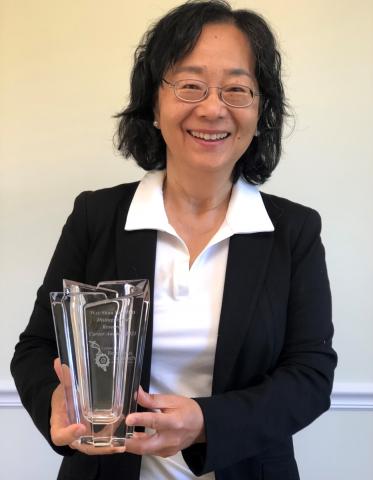
Dr. Wei-Shau Hu received her Ph.D. in Genetics from the University of California, Davis, in 1987, where she studied the mechanisms of DNA recombination that lead to human α-thalassemia in Dr. James Shen's laboratory. Under Dr. Howard Temin's guidance, Dr. Hu studied the mechanisms of retroviral recombination as a postdoctoral fellow at the University of Wisconsin-Madison. In 1991, Dr. Hu joined the faculty of West Virginia University as an Assistant Professor in the Department of Microbiology and Immunobiology and the Mary Babb Randolph Cancer Center. She was promoted to Associate Professor with tenure in 1998. In 1999, she joined the National Cancer Institute (NCI) as Senior Investigator and Head of the Viral Recombination Section in the HIV Drug Resistance Program (renamed the HIV Dynamics and Replication Program in 2015). Dr. Hu was an organizer of the 2009 Cold Spring Harbor Laboratory Retroviruses Meeting. She served as the Frederick representative of Women Science Advisors for the NCI from 2012 to 2016 and as a member of the AIDS Molecular and Cellular Biology Study Section of the National Institutes of Health extramural grant funding programs from 2010 to 2016. She currently serves as a member of the HIV Interactions in Viral Evolution (HIVE) Center, NCI Promotion Review Panel, and the steering committee of NCI RNA Biology Initiative. Dr Hu’s research has been focused on HIV, and she is an international leader in retroviral recombination, RNA packaging, and virus assembly, with numerous publications in outstanding journals, such as Science, PNAS, Molecular Cell, PLoS Paths etc. Her innovations in combining molecular biology and biochemical approaches with state-of-the-art microscopy techniques for single-virion particle analysis have led to significant advancements in HIV molecular virology research. In 2021, Dr. Hu was elected as a Fellow of American Academy of Microbiology.
Dr. Hu was selected by the Center for Retrovirus Research of The Ohio State University to receive the 2021 Distinguished Research Career Award in recognition of her substantial body of work contributing to our understanding of retroviral recombination, RNA packaging, and virus assembly. Dr. Hu’s keynote seminar was entitled “How Does HIV-1 Transfer Genetic Information to Its Progeny?”
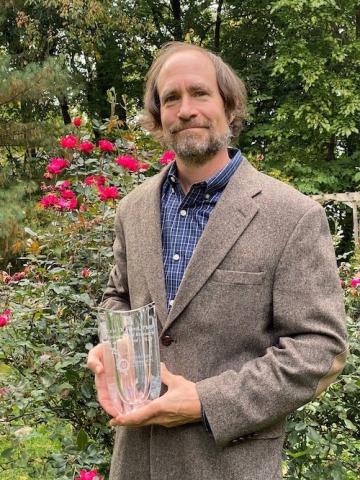
Dr. Eric Freed received his PhD in 1990 in the laboratories of Drs. Re Risser and Howard Temin at the University of Wisconsin-Madison and did postdoctoral work with Dr. Temin at UW-Madison in 1991. His work in Madison focused on the function of the murine leukemia virus and HIV envelope glycoproteins in membrane fusion and virus entry. he joined the Laboratory of Molecular Microbiology (LMM) at the National Institute of Allergy and Infectious Diseases (NIAID) in 1992, where he worked with Dr. Malcolm Martin on HIV assembly and entry/post-entry events in the HIV replication cycle. In 1997, Dr. Freed was appointed as a Tenure-Track Investigator in LMM/NIAID, and he was promoted to a tenured Senior Investigator position in 2002. In 2003, he joined the HIV Drug Resistance Program (HIV DRP, renamed as the HIV Dynamics and Replication Program in 2015).
He was an organizer of the 2004 Cold Spring Harbor Meeting on Retroviruses, 2006 ASCB Conference "Cell Biology of HIV-1 and Other Retroviruses," 2012 Keystone Symposium "Frontiers in HIV Pathogenesis, Therapy Eradication," 2014 Keystone Symposium "The Ins and Outs of Viral Infection: Entry, Assembly, Exit and Spread," Viruses 2016 Conference "At the Forefront of Virus-Host Interactions," and Viruses 2018 Conference "Breakthroughs in Virus Replication," and he served on the Scientific Committee of the International Retroviral Nucleocapsid Protein and Assembly Symposium in 2013 and 2016.
He was appointed as the first Editor-in-Chief of Viruses in 2009, Editor of Journal of Molecular Biology in 2012, and Editor of Recent Advances in HIV-1 Assembly and Release in 2013. He also currently serves on the Editorial Boards of a number of journals, including Journal of Virology, Retrovirology, and Frontiers in Virology, and is an Associate Editor for Science Advances and Fields Virology.
He was selected as an NCI Mentor of Merit in 2010 for excellence in mentoring and guiding the careers of trainees in cancer research, and in 2011 he was appointed to the NCI Senior Biomedical Research Service. Dr. Freed was appointed as the Deputy Director of the HIV DRP in 2014 and became Director of the HIV DRP in 2015. He was a sitting member of the NIH AIDS Discovery and Development of Therapeutics (ADDT) study section (2012-2017) and served as ADDT Chair from 2015-2017. He received the Outstanding Science Alumni Award from Penn State University in 2014 and the NCI Research Highlights Award in 2016.
He is currently Chair of the Advisory Panel of the CRR Center for Molecular Microscopy, Co-Chair of the NIH Virology Interest Group, Chair of the 2018 Norman P. Salzman Memorial Symposium in Virology, and Co-Organizer of the gp41 Cytoplasmic Tail Structure and Function Workshop, and served on the Organizing Committee of the 2018 Annual Meeting of the American Society for Virology. He is also a Co-Director of the University of Maryland Virology Program and an Adjunct Professor in the Department of Cell Biology and Molecular Genetics at the University of Maryland, College Park. In recognition of his outstanding contributions to the field of retrovirology, Dr. Freed was awarded the KT Jeang Retrovirology Prize in 2018. He was elected to Fellowship in the American Academy of Microbiology in 2019.
Dr. Freed was selected by the Center for Retrovirus Research of The Ohio State University to receive the 2020 Distinguished Research Career Award in recognition of his substantial body of work contributing to our understanding of HIV-1 molecular pathogenesis and the mechanism of retrovirus entry into target cells.
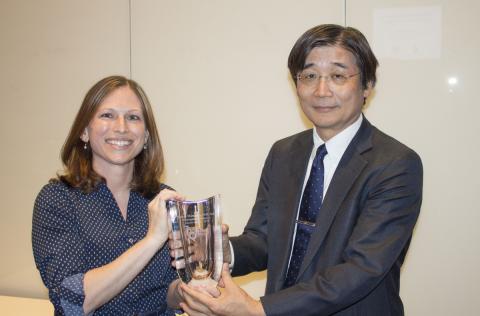
Masao Matsuoka, MD, PhD is a physician/scientist and oncologist who received his medical and doctorate degrees from Kumamoto University School of Medicine in Japan. He then completed a postdoctoral fellowship at the University of California, Berkeley. Following his postdoc, Dr. Matsuoka returned to Japan where he became Professor and eventually Director of the Institute for Virus Research at Kyoto University. He currently serves as Professor in the Department of Hematology, Rheumatology and Infectious Diseases at Kumamoto University.
Dr. Matsuoka is a leader and innovator in human T-cell leukemia virus type 1 (HTLV-1) research. HTLV-1 was the first identified pathogenic human retrovirus and is the etiologic infectious agent of adult T-cell leukemia (ATL). Dr. Matsuoka’s earlier work uncovered both genetic and epigenetic inactivation of the viral Tax oncogene in ATL cells. These results led to our understanding of how HTLV- 1 latency is achieved. He also found that the 3’ LTR of the HTLV-1 provirus is remarkably hypomethylated, leading him to the discovery of the anti-sense viral transcript, Hbz. Not only is Hbz expressed in all ATL cells, but Dr. Matsuoka made the pivotal discovery that both the Hbz protein and RNA have proliferative effects in infected T cells. In addition, he found Hbz expressing transgenic mice develop T cell lymphomas – further highlighting the critical role of Hbz along with the transactivator, Tax, in ATL development.
Dr. Matsuoka and his research team are currently focused on the molecular pathogenesis of ATL. As a researcher who connects clinical science and retrovirology, his work also involves the establishment of novel therapeutics, such as antivirals and immunotherapy, to ATL and other HTLV-1-associated diseases.
Dr. Matsuoka has published over 200 research articles, reviews and book chapters in the field of retrovirology. He is the associate editor of Cancer Science and an editorial board member of Retrovirology, Current Opinion in Virology, and Cancer Research. He was previously awarded the 2011 Retrovirology Prize, which recognizes the achievements of an outstanding retrovirologist.
Dr. Matsuoka was selected by the Center for Retrovirus Research of The Ohio State University to receive the 2019 Distinguished Research Career Award in recognition of his substantial body of work on HTLV-1 molecular pathogenesis and patient therapies.
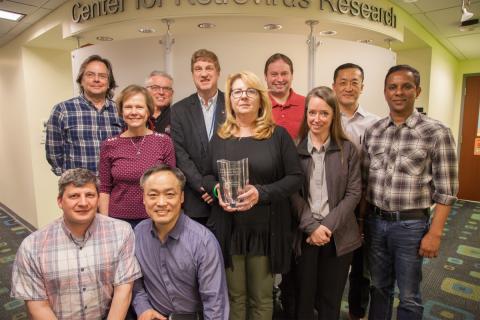
Dr. Daria J. Hazuda received her Ph.D. in biochemistry from the State University of New York, Stony Brook, where she trained with Dr. Cheng-Wen Wu. She performed her postdoctoral studies at Smith, Kline, and French in their Department of Molecular Genetics. In 1989, Dr. Hazuda joined Merck Research Laboratories as a Senior Research Biochemist and is now Vice President and Therapeutic Area Head, Infectious Diseases, and Chief Scientific Officer of the Merck Exploratory Science Center.
While at Merck Research Laboratories, Dr. Hazuda has focused on the development of antiviral therapeutics. Her leadership led to the development of the first HIV-1 integrase inhibitor Isentress (Raltegravir) as well as HCV inhibitors Elbasvir and Grazoprevir. In addition to her work in drug development, Dr. Hazuda made seminal contributions to our understanding of the HIV-1 integrase mechanism, including the roles of divalent cations in integration complex assembly and enzymatic activity. In 2008, her group performed one of three landmark genome scale siRNA screens to identify host factors that influence HIV-1 infection.
Dr. Hazuda is an author of over 190 research articles, reviews and book chapters. She holds 28 U.S. patents. She serves on the amfAR, American Foundation for AIDS Research, Advisory Council and the editorial boards of ACS Infectious Diseases and the Journal of Virus Eradication. She has previously served on NIH study sections and the HCV Drug Resistance Advisory Group.
In 2010 Dr. Hazuda was elected as a Fellow to the American Academy of Microbiology. She has been awarded several international honors, including the David Barry DART Development of Antiretroviral Therapies Achievement Award and the Italian Premio Galeno Award for her work with Isentress.
Dr. Hazuda was selected by the Center for Retrovirus Research of The Ohio State University to receive the 2018 Distinguished Research Career Award in recognition of her substantial body of work on retroviruses and antiviral therapeutics.
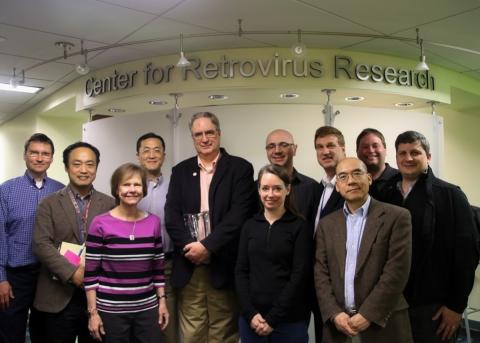
Dr. Stephen H. Hughes received his Ph.D. from Harvard University under the direction of Dr. Mario Capecchi and performed postdoctoral research under the direction of Drs. J. Michael Bishop and Harold Varmus at the University of California, San Francisco. From 1979 until 1984, Dr. Hughes was a Senior Staff Investigator at Cold Spring Harbor Laboratory. In 1984, he established the Gene Expression in Eukaryotes Section at the National Cancer Institute (NCI)-Frederick. He became Deputy Director of the ABL-Basic Research Program in 1988 and Director of the Molecular Basis of Carcinogenesis Laboratory at the NCI-Fredrick in 1995.
In 1999, Dr. Hughes joined the HIV Drug Resistance Program (HIV DRP) at the NCI as Chief of the Retroviral Replication Laboratory. In 2005, he was appointed Acting Director of the HIV DRP and Acting Chief of the Host-Virus Interaction Branch. He was Director of the HIV DRP from 2006 to 2015. He has successfully trained many junior scientists.
Dr. Hughes is an Organizer of the Annual HIV DRP Conference and David Derse Memorial Lecture and Award and has served as an Organizer of the Retroviruses and Viral Vectors Meetings at Cold Spring Harbor Laboratory and the Annual Meeting on Oncogenes. He has been invited to present his cutting-edge research at numerous national and international conferences and seminars at leading research institutions worldwide. He will be a keynote speaker at the 2017 Cold Spring Harbor Laboratory Meeting on Retroviruses.
Dr. Hughes and his colleagues have published over 323 research articles and 41 invited book chapters, reviews, and commentaries. He was named one of the most frequently cited AIDS researchers by Science Watch in 1996. Dr. Hughes holds eight issued and two pending U.S. patents derived from his innovative retrovirus research and antiviral drug development.
Dr. Hughes was elected to the American Academy of Microbiology in 2007. He also has received numerous prestigious awards, including an NCI Technology Transfer Award, NIH Intramural AIDS Targeted Antiviral Program Research Awards, an NCI Director’s Award, and an NCI Special Act or Service Award for Groundbreaking Advances.
Dr. Hughes has served as the Editor of Technique and as an editorial board member of Journal of Virology, Molecular and Cellular Biology, Virology, and Antimicrobial Agents and Chemotherapy. Dr. Hughes also serves as a member of many national and international committees and boards, such as the FDA Vaccines and Related Biological Products Advisory Committee, NCI-Frederick Institutional Biosafety Committee, and the World Health Organization Study Group on Cell Substrates for Production of Biologicals.
Dr. Hughes was selected by the Center for Retrovirus Research of The Ohio State University to receive the 2017 Distinguished Research Career Award in recognition of his substantial body of work on retroviruses.
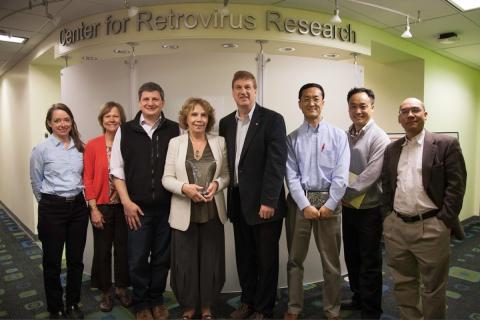
Dr. Genoveffa Franchini has been the Chief of the Animal Models and Retroviral Vaccines Section, Center for Cancer Research, National Cancer Institute at NIH in Bethesda, Maryland since 1997.
Dr. Franchini received her MD from the University of Modena in Italy and is certified by the Board of Hematology. Her postdoctoral training at NIH in Bethesda began as a Fogarty Fellow in 1979. She worked with Dr. Robert Gallo during the exciting discovery of HIV-1, the AIDS virus. Since that time, she has continued her highly productive scientific career at NIH.
Dr. Franchini has made exceptional contributions to the field of retrovirology from molecular biology to translational vaccine strategies. Her early work characterized the oncogenes of several retroviruses. She has studied the persistence and pathobiology of multiple oncogenic retroviruses and lentiviruses, including HTLV-1, HIV-1 and SIV. She was the first to sequence SIV and made the critical identification of the fusion peptide of SIV and HIV.
HTLV-1
Dr. Franchini has made several seminal contributions to our understanding of the first identified human pathogenic retrovirus, HTLV-1. She sequenced multiple HTLV-1 patient isolates and showed that the infected tumor cells were clonal. She has since identified and characterized the roles of multiple HTLV-1 proteins, including Tax, p8, p12 and p30. This body of work has led to deeper understanding of the ability of HTLV-1 to persist and transform T cells, leading to leukemia.
Retroviral Vaccines
Dr. Franchini has been working on HIV vaccine development for over 20 years. A pre-clinical trial of an HIV vaccine regimen developed in her laboratory was the first to demonstrate protection in human subjects. She has extensively characterized the adaptive and innate immune responses to viral infection and vaccination. Her continued development of vaccine strategies in non-human primate models importantly includes evaluation of mucosal transmission and gender differences. Her work has extended to the development of a novel combination DNA and recombinant protein vaccine strategy to prevent monkeypox infection of non-human primates, which could be applied to smallpox.
Dr. Franchini holds numerous patents and has published over 290 papers. She serves on the editorial boards of seven journals and chairs the HIV vaccine study section. She has been awarded the Outstanding Mentor Award five times from the NCI Fellowship Office, the NCI Mentor of Merit Award twice, as well as the NCI Director Award and the NIH Award of Merit.
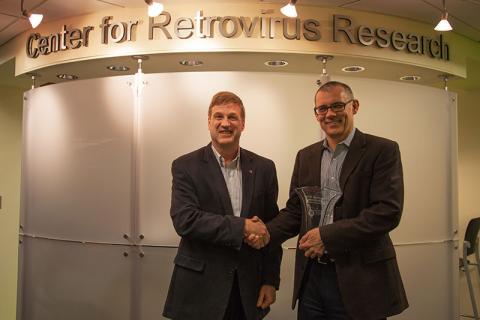
Dr. Paul Bieniasz’s research program addresses the conundrum that mammalian cells are well-equipped to inhibit virus replication, yet human retroviruses ultimately win the virus-host standoff. Using tools of molecular virology, genetics and genome-wide discovery, Dr. Bieniasz’s research explores the basic mechanisms underlying retrovirus-host interactions, focusing on how HIV and related viruses replicate in cells. By identifying several host proteins necessary to promote or prohibit the replication of retroviruses, Dr. Bieniasz has taken strides toward understanding the molecular basis for HIV/AIDS.
In discovering the host defense molecule Tetherin, Dr. Bieniasz’s research uncovered a previously unknown host activity: the formation of protein-based tethers that cause retention of fully formed HIV-1 particles on infected cell surfaces. Overcoming this restriction to spreading infection is Vpu, an HIV-1 encoded antagonist of Tetherin and thereby promotes the release and dissemination of HIV-1 particles from Tetherin-expressing cells.
The Bieniasz group determined ubiquitin ligases and components of the class E vacuolar protein-sorting pathway induce the fusion of virus and cellular membranes, promoting the release of nascent virus particles. The evaluation of HIV-1 RNA binding activity in cells and virions using cross-linking and RNAseq approaches revealed functional distinction in viral RNA binding activity: in the cytoplasm, Gag is bound to RNA sequences rich in guanine, but at the plasma membrane, Gag binding behavior changed to favor HIV’s unusual adenine – rich sequence bias. Thus, Bieniasz’s screening approach is unveiling the relationship of viral RNA sequence bias to assembly of infectious HIV-1.
Another antiretroviral protein, myxovirus resistance 2 (MX2), was identified by Dr. Bieniasz’s comparative gene expression profiling of cells that differ in the activity of interferon-induced genes to inhibit virus replication. MX2 was identified to inhibit the ability of the virus to generate a provirus, the DNA form of the retrovirus, that is essential to complete the virus life cycle. MX2 inhibits HIV-1 infection by inhibiting capsid-dependent nuclear import of the subviral complex containing the reverse transcribed DNA.
Converting fundamental discoveries into practical benefits is an overarching goal of Dr. Bieniasz and his colleagues; in particular, they are working toward the goal of a better animal model of human AIDS. By engineering and adapting specific components of HIV-1 to avoid or inactivate the growing list of host restriction factors, including TRIM5 and APOBEC3, his group successfully derived simian cell tropic HIV-1 strain (stHIV-1). The generation of HIV-1 strains that can replicate in monkeys would be of enormous practical benefit and would likely revolutionize preclinical studies of HIV-1 drugs and vaccines.
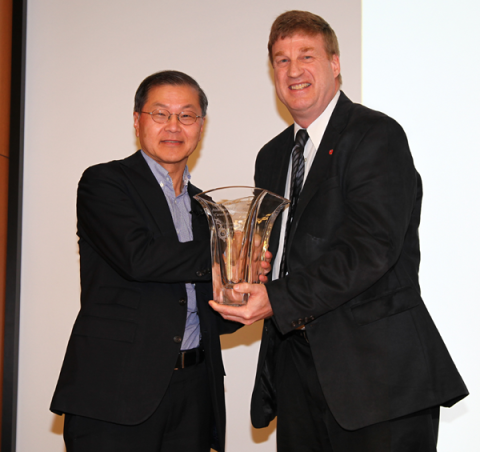
David D. Ho, M.D. is the founding Scientific Director and Chief Executive Officer of the Aaron Diamond AIDS Research Center, a world-renowned biomedical research institute, and the Irene Diamond Professor at The Rockefeller University.
Dr. Ho received his degrees from California Institute of Technology (1974) and Harvard Medical School (1978). Subsequently, he did his clinical training in internal medicine and infectious diseases at Cedars-Sinai Medical Center/UCLA School of Medicine (1978-1982) and Massachusetts General Hospital/Harvard Medical School (1982-1985), respectively.
Dr. Ho has been at the forefront of AIDS research for 33 years, publishing over 350 papers. His elegant studies, beginning in 1994, unveiled the dynamic nature of HIV replication in vivo and revolutionized our basic understanding of this horrific disease. This knowledge led Dr. Ho to champion combination antiretroviral therapy that resulted in unprecedented control of HIV in patients. AIDS mortality in richer nations has declined 6-fold since 1996, and a massive international effort is now underway to bring such life-saving treatment to millions in the developing world. Dr. Ho has been the major driving force behind this major medical breakthrough in what is arguably the worst plague in human history. Dr. Ho's research team is now devoting considerable efforts to develop vaccines to halt the spread of the AIDS epidemic. Furthermore, he is leading a consortium of Chinese and American organizations to help address the crisis of HIV/AIDS in China.
Dr. Ho has received numerous honors and awards for his scientific accomplishments. He is the recipient of 12 honorary doctorates (including from Swarthmore, Tufts, Columbia, Tulane, University of Natal, Tsinghua University and University of Hong Kong). He has been chosen as the commencement speaker at Caltech, MIT, and Harvard School of Public Health. Additional accolades include the Ernst Jung Prize in Medicine, Mayor's Award for Excellence in Science & Technology, the Squibb Award, and the Hoechst Marion Roussel Award. Dr. Ho has been elected as a member of the American Academy of Arts and Sciences, Academia Sinica (Chinese Academy of Engineering, and the Institute of Medicine, National Academy of Science. He was a member of the Board of Overseers of Harvard University and is a board member of the MIT Corporation. He was inducted into the California Hall of Fame in 2006.
Dr. Ho was named Time Magazine's Man of the Year in 1996, and was the recipient of a Presidential Medal in 2001.
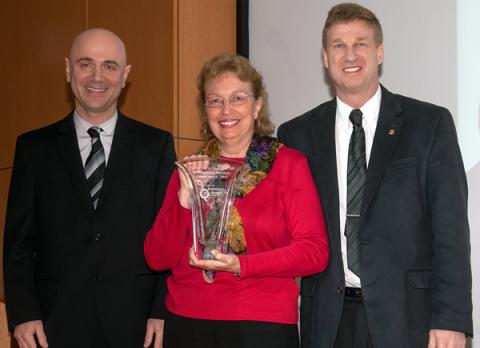
Anna Marie Skalka, PhD. Professor and W. W. Smith Chair in Cancer Research, Senior Advisor to the President, Fox Chase Cancer Center, Philadelphia, PA
Dr. Anna Marie (Ann) Skalka obtained her Ph.D. degree in Microbiology from New York University Medical School with Dr. Jerard Hurwitz, and was a postdoctoral fellow with Nobel Laureate, Dr. Alfred Hershey, at the Carnegie Institution in Cold Spring Harbor. She continued her scientific career at Roche Institute of Molecular Biology and Hoffmann-La Roche, Inc., where she held several key positions including Head of Department of Molecular Oncology at Roche Institute of Molecular Biology, and Assistant Vice President of Hoffmann-La Roche, Inc. Since 1987, Dr. Skalka has been a Professor and the W. W. Smith Chair in Cancer Research at the Institute for Cancer Research at the Fox Chase Cancer Center in Philadelphia. She also served as Senior Vice President for Basic Science from 1987 until 2008.
Dr. Skalka’s major research interests are the molecular aspects of the replication of retroviruses. She is internationally recognized for her seminal contributions to our understanding of the biochemical mechanisms by which retroviruses (including HIV) replicate and insert their genetic material into the host genome. Dr. Skalka’s recent work has focused on elucidating the architecture of a key retroviral enzyme, integrase, and has provided critical information for both understanding the function of this protein as well as exploiting it as a therapeutic target. Dr. Skalka has published more than 240 scientific papers and scholarly reviews, has edited several scientific books, organized and spoken at national and international meetings and conferences, and is coauthor of the widely acclaimed textbook, Principles of Virology.
Dr. Skalka has served on the editorial boards of several peer-reviewed scientific journals and has been a member of numerous advisory boards, including the National Cancer Institute Board of Scientific Counselors, the General Motors Cancer Research Foundation Awards Assembly, the Board of Governors of the American Academy of Microbiology, and the National Advisory Committee for the Pew Biomedical Scholars Program. Dr. Skalka has also been deeply involved in state, national, and international advisory groups concerned with the broader, societal implications of scientific research; including chairing the NJ Commission on Cancer Research. In recognition of her outstanding research accomplishments, she has been elected to the American Academy of Arts and Sciences, the American Association for the Advancement of Science, and to the Board of Governors of the American Academy of Microbiology.
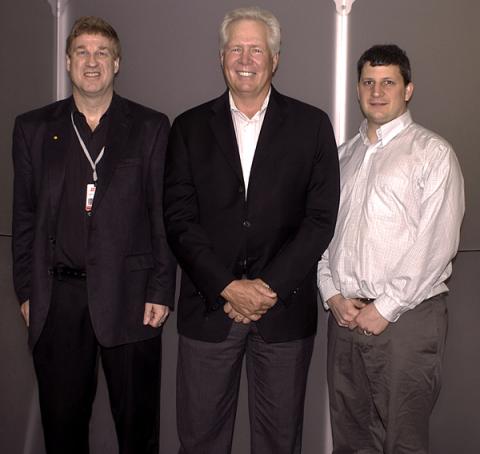
Warner C. Greene, MD, PhD Director, Gladstone Institute of Virology and Immunology Nick and Sue Hellmann Distinguished Professor of Translational Medicine, Professor of Medicine, Microbiology and Immunology, Co-Director, UCSF-GIVI Center for AIDS Research University of California, San Francisco
Dr. Warner C. Greene is the director of the Gladstone Institute of Virology and Immunology (GIVI) in San Francisco, a premier research center dedicated to fundamentalstudies of modern virology and immunology with a focus on HIV and AIDS. Dr. Greene's basic and translation studies of HIV and HTLV have fundamentally contributed to ourunderstanding of human retroviruses and viral pathogenesis. His current research focuses on the pathogenic interplay between human retroviruses and immune cells to define the mechanisms underlying viral replication and transmission. Dr. Greene's laboratory also pursues basic studies on important transcription factors to better understand their roles in HIV latency.
Dr. Greene received his BA degree with great distinction from Stanford University and his MD and PhD degrees with honors from Washington University School of Medicine. He then completed his residency training in Internal Medicine at the Massachusetts General Hospital at Harvard University. From 1979-1986, he served as a senior investigator at the National Cancer Institute, where he established his research laboratory. In 1987, he became professor of medicine at Duke University and an Investigator in the Howard Hughes Medical Institute. In 1992, Dr. Greene became the founding director and a senior investigator of the GIVI and was also appointed a professor of medicine, microbiology, and immunology at the University of California, San Francisco (UCSF).
Dr. Greene is the author of more than 350 scientific papers and has been recognized as one of the 100 Most Cited Scientists in the world. He has been invited for many distinguished lectures worldwide. Dr. Greene is a member of the Institute of Medicine of the National Academies, a fellow of the American Academy for the Advancement of Science, and President-Elect of the American Association of Physicians. He also serves as co-director of the UCSF-GIVI Center for AIDS Research. Dr. Greene has mentored more than 120 students and fellows during his over 30 year career in science. Many of his trainees have become independent researchers.
In addition to his distinguished research contributions, Dr. Greene also dedicates his time and effort to community service to enhance public health. Since 2007, he has served as President of the Accordia Global Health Foundation, whose mission is to overcome the burden of infectious diseases in Africa by creating innovative health models, building centers of excellence, and strengthening medical institutions.
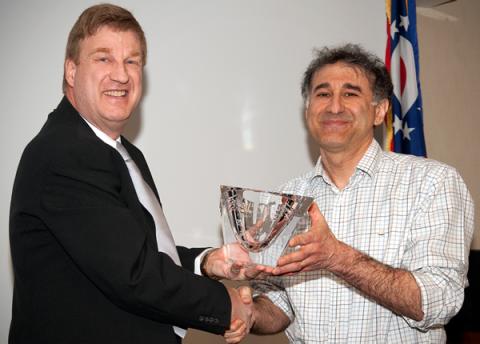
Michael Emerman, PhD. Member, Division of Human Biology, Fred Hutchinson Cancer Research Center
Dr. Michael Emerman grew up in Columbus, Ohio and received his B.S. in Biochemistry at The Ohio State University. Dr. Emerman obtained his Ph.D. in Cellular and Molecular Biology at the University of Wisconsin-Madison in 1986 under the guidance of Dr. Howard Temin, a 1975 Nobel Laureate in Physiology or Medicine, where he used retroviruses to study how gene control elements could interfere with one another. During his graduate student years, HIV, the virus responsible for causing AIDS was discovered, and Dr. Emerman continued postdoctoral training at the Pasteur Institute in Paris to work with its co-discoverer, Luc Montagnier (2008 Nobel Laureate in Physiology or Medicine). During that time, Dr. Emerman characterized HIV-2 and discovered the function of one of the key regulatory genes of HIV-1. Since 1989, Dr. Emerman has been a Member of the Fred Hutchinson Cancer Research Center (FHCRC) in Seattle, Washington and an Affiliate Professor in the Departments of Microbiology and Global Health at the University of Washington.
Dr. Emerman has published over 100 peer-reviewed articles in the field of molecular virology with an emphasis on the biology of HIV. He was the recipient of an American Foundation for AIDS Research Scholar Award and a National Institute of Allergy and Infectious Diseases Merit Award. He serves as Editor of Virology, Associate Editor of PLoS Pathogens, and Academic Editor of PLoS Biology. He has also served on multiple NIH study sections. Since 2006 he has been Director of the Molecular and Cellular Biology Ph.D. program at the University of Washington/FHCRC where he also teaches a popular graduate course called "Human Pathogenic Viruses."
Dr. Emerman is an internationally renowned investigator making significant scientific contributions to the understanding of the molecular and cellular biology of HIV. Early investigations by his group showed that HIV is different from other viruses in its family by being able to infect non-dividing cells. This property has been exploited by others to develop HIV-like gene transfer vectors. Dr. Emerman also discovered that an HIV protein, Vpr, causes cell cycle arrest. Recently, Dr. Emerman has focused on the evolutionary battle between viruses and their hosts using HIV as a model for determining why innate immune defenses do not function well against HIV. Along with collaborators, Dr. Emerman has characterized the evolution and function of host antiviral genes and the antagonists against these defenses that are encoded by viruses. He invented a name for these studies, "Paleovirology," to capture the concept that ancient viruses have shaped the human repertoire of antiviral defenses in ways that impact our resistance or susceptibility to modern-day emerging viruses.
Dr. Emerman received the engraved crystal award sculpture and presented the special lecture "Evolution of Immunodeficiency Virus-Host Interactions". Dr. Emerman presented a second lecture entitled "Function and evolution of the APOBEC3 family of primate antiviral genes", both in April 2011 at The Ohio State University.
Dr. Emerman's visit was sponsored by the Center for Retrovirus Research, Departments of Veterinary Biosciences and Molecular Virology, Immunology and Medical Genetics, Public Health Preparedness for Infectious Diseases Program, and the Comprehensive Cancer Center Viral Oncology Program.
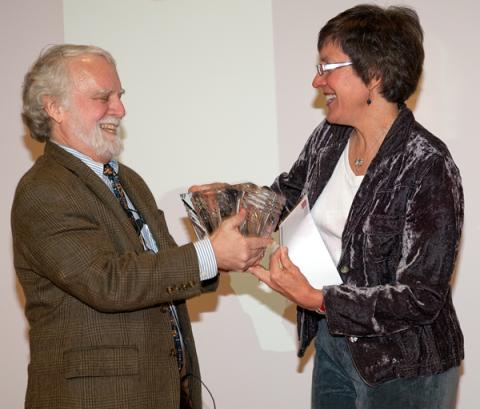
Stephen P. Goff, PhD. Higgins Professor of Biochemistry and Molecular Biophysics and Microbiology, Investigator, Howard Hughes Medical Institute, Columbia University College of Physicians and Surgeons
Throughout his distinguished career, Dr. Goff has strategically and cleverly leveraged viruses to decipher how normal cells enable virus replication, yet defend against pathogenic infection, or are co-opted to drive malignant transformation or fatal immunodeficiency
Dr. Goff developed the first methods to deliver recombinant DNA molecules into mammalian cells by employing SV40 virus, and was among the first to prepare molecular clones of retroviruses. He isolated the Abelson murine leukemia virus; identified the v-abl oncogene that is the cause of the viral cancer; and discovered the c-abl proto-oncogene in the normal mouse chromosome. Dr. Goff's work led to realization that ABL is aberrantly expressed in chronic myelogenous leukemia in humans and led to the derivation of the efficacious anticancer drug Gleevec. Dr. Goff defined the functional domains of viral pol gene products, which are separable into the, RNA/DNA polymerase and RNase H domains, and integrase. Dr. Goff identified the integrase function that inserts proviral DNA into the host chromosome, which is the basis for retroviral vector transduction and a major target of successful anti-HIV-1 drugs
Utilizing the power of the yeast two-hybrid system, genetic screens, and somatic cell genetics, Dr. Goff has discovered several host gene products that interact with retroviral protein or RNA and modulate infectivity and escape from host restriction by distinct mechanisms. For example, cyclophilin A, a host prolyl isomerase, binds specifically to HIV-1 Gag, and regulates both infectivity and escape from host restrictions; the novel zinc-finger antiviral protein (ZAP) binds specific sequences in viral RNAs and directs their degradation; TRIM28 mediates primer binding site-targeted silencing of retroviruses that utilize Lys1,2 tRNA in embryonic cells; and eIF3f affects 3' end processing of HIV-1 and can inhibit viral replication. To date sixty predoctoral and postdoctoral scientists under the mentorship of Dr. Goff have contributed to this exceptional research of broad scope and impact.
Dr. Goff received the engraved crystal award sculpture and presented the special lecture "Innate Immunity against Infectious Diseases: New Paradigms from Host Restriction of Retrovirus Replication". Dr. Goff presented a second lecture entitled "RNA Structures Regulating Retrovirus Replication", both in April 2010 at the The Ohio State University.
Dr. Goff's visit was sponsored jointly by the Center for Retrovirus Research and the Dept of Veterinary Biosciences, Dept of Molecular Virology, Immunology and Medical Genetics, and the Comprehensive Cancer Center Viral Oncology Program.
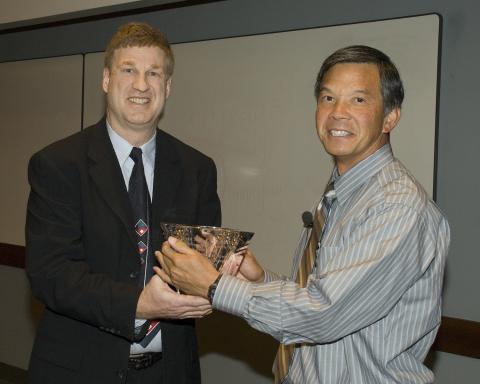
Irvin S. Y. Chen, Ph. D., Director of the UCLA AIDS Institute and Professor of Microbiology & Immunology and Medicine at the UCLS School of Medicine.
Dr. Irvin S.Y. Chen received his B.A. in biology/genetics at Cornell University, and his Ph.D. in molecular biology at the University of Wisconsin-Madison under the guidance of Dr. Howard Temin, a 1975 Nobel Laureate in Physiology or Medicine. Dr. Chen continued research training at UCLA with Dr. David Golde focusing his post-doctoral studies on the newly identified human T-cell leukemia viruses. Since 1990, Dr. Chen has been Professor of Microbiology & Immunology and Medicine in the UCLA School of Medicine. Dr. Chen has published over 230 peer-reviewed articles in the field of molecular virology and he is the recipient of numerous scientific awards and honors including a National Cancer Institute Merit Award and a Leukemia Society of America Scholar Award. In 1991 he became the founding Director of the UCLA AIDS Institute and he has also served as director of numerous laboratories in the UCLA Medical Center including a multi-million dollar UCLA Center for AIDS Research (CFAR) and National Institutes of Health Infrastructure program. For ten years, he served as an Editor for the Journal of Virology.
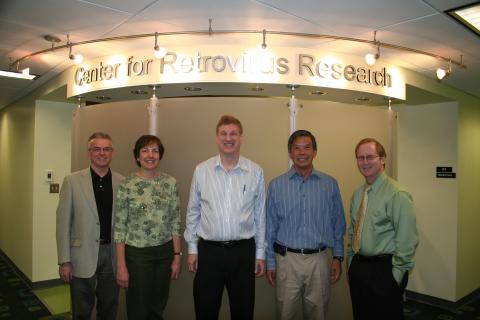
Dr. Chen is an internationally renowned investigator in cancer and AIDS research, and he has made significant scientific contributions to the study of the human retroviruses: human T cell leukemia virus type 1 and 2 (HTLVs) and human immunodeficiency virus type 1 (HIV-1). He was the first to clone HTLV 2, and he is co-inventor of a blood screening test that is used in blood banks worldwide. He has made a number of fundamental discoveries regarding how HTLV and HIV-1 infect cells and cause disease. Early investigations by his group on the genetic variation of HIV-1 determining cell tropism led to subsequent discovery by others of the HIV-1 co-receptor CCR5. Recent work is directed at genetically ablating CCR5 as a therapy for HIV-1 disease. Dr. Chen was the first to develop gene therapy vectors that can target specific cells and tissues of the body through intravenous injection. Dr. Chen has been awarded four patents arising from his scientific discoveries.
In his capacity as Director of the UCLA AIDS Institute, Dr. Chen coordinates all AIDS-related patient care, education and research activities at UCLA and affiliated hospitals. He also has extensive industrial collaborations with various pharmaceutical companies, including Amgen, Merck, and Abbott Laboratories. He is currently engaged in a start-up company for HIV-1 genetic therapy involving collaborations with UCLA, Salk Institute, and Cal-Tech. In his academic and administrative positions, Dr. Chen continues to transform fundamental discoveries from the basic research at the bench to therapeutic application at the bedside.
Dr. Chen received the engraved crystal award sculpture and presented the special lecture "Turning the Tables: Stem Cell Modification using HIV to Fight HIV" in April 2009 at the College of Veterinary Medicine on the campus of The Ohio State University.
Dr. Chen's visit was sponsored jointly by the Center for Retrovirus Research and and the Dept of Veterinary Biosciences, Dept of Molecular Virology, Immunology and Medical Genetics, and the Viral Oncology Program of The Ohio State University Comprehensive Cancer Center.
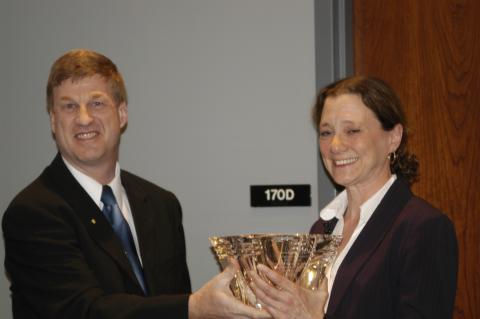
Susan R. Ross, Ph.D., Professor of Microbiology, Associate Dean for Biomedical Graduate Education, and Director of Biomedical Graduate Studies, University of Pennsylvania School of Medicine, Philadelphia, PA
Dr. Susan R. Ross has elucidated several mechanisms that determine susceptibility to retrovirus infection and virus-induced mammary tumors. She answered the question of how retroviruses infect their initial targets in vivo and established that dendritic cells play a crucial role in virus infection. Her discoveries that dendritic cells are the initial targets of MMTV infection and that MMTV activates dendritic and B cells via toll-like receptor 4, a component of the innate immune system, are paradigms that guide studies of human retrovirus infections.
Her studies documented for the first-time a crucial role of intrinsic cellular immunity in viral pathogenesis. In a study published in Nature, Dr. Ross determined that APOBEC3 provides protection to mice against MMTV infection and represent the first demonstration of its protective function against retroviral infection in vivo. She has identified another genetic locus that affects virus spread in lymphocytes by study of dominant susceptibility to MMTV infection in backcrossed strains of mice. Her results obtained from combined functional/genetic approaches are greatly increasing our understanding of the mechanisms that viruses use to infect their hosts and how genetic resistance may occur.
Dr. Ross has evaluated the prevalence of serologic reactivity against MMTVs in women with breast cancer. She mapped the segments of the mouse receptor important for virus infection and confirmed that human TfR1 does not function as an MMTV entry receptor. Dr. Ross determined that the MMTV envelope protein influences breast cancer induction by the activity of immuno-tyrosine based activation motif (ITAM). MMTV that harbors mutation of the ITAM motif are attenuated in mammary tumorigenesis, independently of reduction in infectivity in vivo. By mimicking ITAMs (which are commonly found in receptors expressed in hematopoietic cells and are negatively regulated by cell-type specific modulators) the oncogenic virus envelope protein drives the MMTV transformation process by uncontrolled signaling in epithelial cells. Because ITAMs are found both in viral and cellular proteins, inappropriate expression of such signaling molecules represents a novel mechanism of transformation. These studies guide development of new treatment paradigms for breast and other cancers, especially those associated with viruses that encode proteins to activate ITAM-mediated signaling.
Dr. Ross received the engraved crystal award sculpture and presented the keynote seminar: "Co-evolution of a Virus and its Host: the Mouse as a Model for Understanding Virus-host Interactions." Dr. Ross presented a chalk-talk seminar at the weekly scientific meeting of the Center for Retrovirus Research: "The role of innate immunity in mouse mammary tumor virus infection." The seminars were presented in April 2008 at the College of Veterinary Medicine on the campus of The Ohio State University.
Support for the annual program was jointly provided by the Center for Retrovirus Research, Department of Veterinary Biosciences, Department of Molecular Virology, Immunology and Medical Genetics, and the Comprehensive Cancer Center Viral Oncology Program.
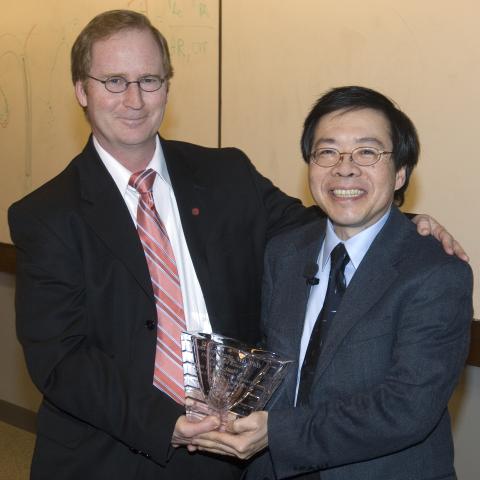
Kuan-Teh Jeang, M.D., Ph. D., Head, Molecular Virology Section, Laboratory of Molecular Microbiology, National Institute of Allergy and Infectious Diseases, National Institutes of Health, Bethesda, Maryland.
Dr. Kuan-Teh Jeang is a prolific leader in the field of molecular virology. His research on the gene regulation of human immunodeficiency virus (HIV-1) and carcinogenic mechanisms of human T-cell leukemia virus type 1 (HTLV-1) has produced 230 peer-reviewed articles, to date. His significant contributions have provided fundamental information into viral and cellular factors that regulate expression of these pathogenic human retroviruses and insights into methods to improve HIV-1-based vectors, design molecular ribozymes targeted against HIV-1, and to identify small antiviral molecules. Some of his notable scientific findings include elucidation of a mechanism for suppression of p53, defining virally-encoded factors that select against HIV-1 CXCR4-tropism, and identification of a mitotic checkpoint protein whose function is abrogated by HTLV-I Tax oncoprotein. His recent pioneering research has demonstrated that deletion of mitotic arrest-deficient protein 1 (MAD1) increases the incidence of tumors in a mouse model, identified that the HIV-1 Tat protein binds Dicer, a key regulator of small interfering RNA, and described a role for Akt/protein kinase B and activator protein-1 in cellular proliferation induced by HTLV-1 Tax.
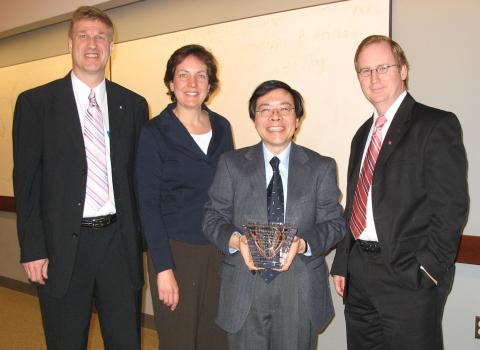
Dr. Jeang received the engraved crystal award sculpture and presented the special lecture "HTLV-1, Adult T-cell Leukemia, and Mechanisms of Cellular Transformation". Dr. Jeang presented a second lecture entitled "HIV-1 and small RNAs: what we are learning", both in April 2007 at the College of Veterinary Medicine on the campus of The Ohio State University.
Dr. Jeang's visit was sponsored jointly by the Center for Retrovirus Research and and the Dept of Veterinary Biosciences, Dept of Molecular Virology, Immunology and Medical Genetics, and the Comprehensive Cancer Center program in Viral Oncogenesis.
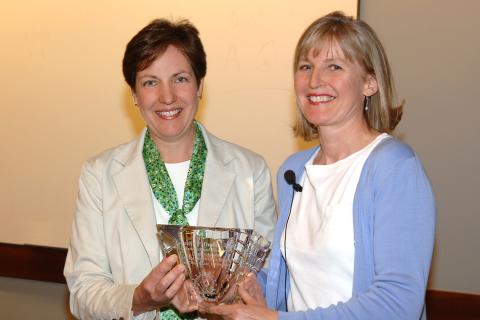
Jaquelin P. Dudley, Professor of Molecular Genetics & Microbiology, University of Texas-Austin for her work on retroviral pathogenesis and control of gene expression.
Dr. Dudley has made key contributions to the understanding of retroviral pathogenesis, how cells achieve tissue-specific gene regulation, and molecular events that culminate in tumorigenesis. Using mouse mammary tumor virus (MMTV), Dr. Dudley has dissected a tightly controlled set of virus-host interactions that allow MMTV to exploit the immune system and specific transcription factors to sustain its complex life cycle. By genetic engineering experiments, Dr. Dudley has defined regions of the virus that switch MMTV-induced neoplasia in mice from mammary carcinomas to other tumor types, particularly T-cell lymphomas. In many years of research that continues today, Dr. Dudley has demonstrated the importance of the virally encoded superantigen gene for the virus life cycle and development of mammary cancer. Interestingly, she found that development of T-cell lymphomas was independent of superantigen expression and required both loss of negative regulatory elements and acquisition of enhancer activity to elevate MMTV expression in T cells, where mammotropic viruses are poorly expressed. To further characterize tissue-specific MMTV expression, Dr. Dudley identified two homeodomain-containing transcription factors, special AT-rich sequence binding protein (SATB1) and CCAAT-displacement protein (CDP/Cutl1). In a series of studies, she demonstrated that the repressor activity of these proteins in different tissues and developmental stages leads to extremely tight regulation of virus expression and allows optimal virus production only when MMTV is transmitted from mothers to offspring during lactation. Dr. Dudley's studies have also led to the discovery of a new MMTV export protein, Rem, which is functionally related to HIV Rev and HTLV Rex, but appears to have additional regulatory controls. Thus, MMTV embodies hallmark features of both genetically simple and complex retroviruses: tumorigenesis associated with MMTV insertions near cellular proto-oncogenes, such as c-myc, as well as coding capacity for multiple accessory proteins.
Dr. Dudley received the engraved crystal award sculpture and presented the special lecture "Gene regulation and cancer: lessons from mouse mammary tumor virus". Dr. Dudley also presented a "chalk talk" entitled "Manipulation of the immune response by MMTV" in April 2006 at the College of Veterinary Medicine on the campus of The Ohio State University.
Dr. Dudley's visit was sponsored jointly by the Center for Retrovirus Research and several OSU Departments of Veterinary Biosciences, and Molecular Virology, Immunology and Medical Genetics, as well as the Comprehensive Cancer Center Program in Viral Oncogenesis.
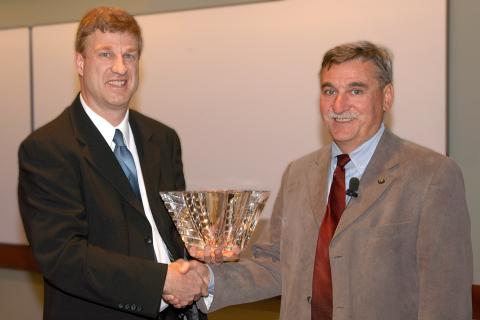
Sixth Annual Distinguished Research Career Award Recognizes Progress in Understanding Viruses That Cause AIDS
Ronald C. Desrosiers, professor of Microbiology and Molecular Genetics, Harvard Medical School and Director of the New England Regional Primate Research Center was the 2005 recipient of The Ohio State University Center for Retrovirus Research Distinguished Research Career Award, which recognizes original and significant research contributions to the field of retrovirus biology. Dr. Desrosiers received the engraved crystal award sculpture and presented the special lecture "Prospects For AIDS Vaccine" on April 7 in the Dunlap Auditorium, Veterinary Medicine Academic Building, 1900 Coffey Road.
Dr. Desrosiers has been an outstanding leader in AIDS research from the earliest years of the epidemic. In 1985, he isolated the first simian AIDS virus and established the first and foremost non-human primate model for HIV infection and AIDS. In 1988, he developed the first molecular clones of this virus, opening the door for detailed molecular studies on pathogenesis. Later, in 1990, he demonstrated that one of his clones induced AIDS in rhesus monkeys, firmly establishing the SIVmac239/rhesus macaque model. Dr. Desrosier is author of more than 239 publications and is internationally recognized for his work on simian AIDS as a model for HIV-1 pathogenesis and for his advances in the herpesvirus samiri system as a model for cancer. Dr. Desrosiers is a fellow of the American Academy of Microbiology, Senior Editor of Journal of Virology and has sat on numerous national AIDS and cancer leadership committees.
Dr. Desrosiers's visit was sponsored jointly by the Center for Retrovirus Research, Department of Molecular Virology, Immunology and Medical Genetics, and the Comprehensive Cancer Center program in Viral Oncogenesis. During his two-day visit, Dr.Desrosiers met with numerous faculty and graduate student researchers and presented a second seminar on his recent work that defines factors that influence neutralization resistance of HIV-1 and SIV.
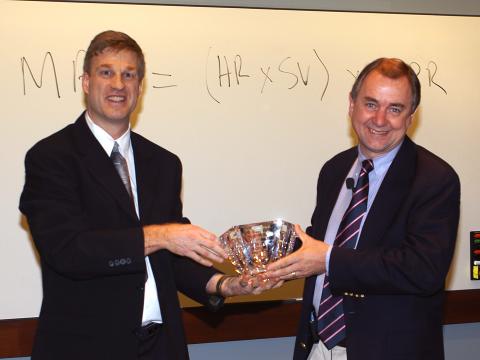
Eric Hunter, professor of Microbiology and Director of the University of Alabama Birmingham Center for AIDS research was the 2004 recipient of The Ohio State University Center for Retrovirus Research Distinguished Research Career Award, which recognizes original and significant research contributions to the field of retrovirus biology. Dr. Hunter received the engraved crystal award sculpture and presented the special lecture "MOLECULAR DETERMINANTS OF HIV-1 ENVELOPE GLYCOPROTEIN THAT MODULATE VIRUS ENTRY AND TRANSMISSION" on April 8 in the East Auditorium, Veterinary Medicine Academic Building, 1900 Coffey Road.
Dr. Hunter has studied retrovirus genetics for over thirty years and is a leading authority on molecular steps used by retroviruses to enter their target cells. Biomedical applications of his research include new antiretroviral drug targets and vaccine development against human immunodeficiency virus. Dr. Hunter is author of more than 150 publications and is internationally recognized for comparative analysis of retrovirus assembly in simian, human and avian hosts.
Dr. Hunter's visit was sponsored jointly by the Center for Retrovirus Research, Dept. of Molecular Virology, Immunology and Medical Genetics, and the Comprehensive Cancer Center program in Viral Oncogenesis. During his two-day visit, Dr. Hunter met with numerous faculty and graduate student researchers and presented a second seminar at the weekly Retrovirus Lab Meeting on his recent work that defines molecular and cellular interactions between the retrovirus and the host protein trafficking machinery.
Dr. Hunter is a fellow of the American Association for the Advancement of Sciences and has sat on numerous national cancer and AIDS leadership committees. Throughout his career, Dr. Hunter has advocated public science education and has been invited for numerous presentations to citizen groups.
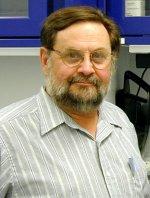
The 2003 Distinguished Research Career Awardee is Dr. John M. Coffin, American Cancer Society Research Professor of Molecular Biology at Tufts University School of Medicine, Boston, MA and Director of the HIV Drug Resistance Program at the National Cancer Institute, Frederick, MD.
Over the past thirty years, Dr. Coffin has studied retrovirus genetics and produced numerous important contributions with broad significance to the fields of molecular virology, cancer genetics, gene expression and evolution.
Dr. Coffin's large body of work includes the elucidation of the genetic structure of retroviruses of murine and avian species and mechanism of DNA synthesis and integration, population dynamics. These studies laid the foundation for rapid understanding of human retroviruses in cancer and AIDS patients.
Dr. Coffin's laboratory classified families of endogenous retroviruses in mice and used them as insightful indicators of the evolution of the host-virus association. Their characterization of alterations in genetic structure associated with cancer illuminated the mechanism by which oncogenic retroviruses capture and express oncogenes. This work included development of a cell culture system that proved that efficient packaging of readthrough RNA is a mechanism of oncogene transduction.
This body of work has provided important inroads into understanding the evolution and pathogenesis of retroviruses, including HIV-1. Dr. Coffin's studies on genetic variation in avian and murine retroviruses set the stage for realization of the awesome potential of HIV to evolve many viral variants, including drug-resistant variants, even before the onset of drug treatment. Dr. Coffin's work has important implications to understanding emergence of drug resistant HIV in AIDS patients that fail drug therapy, to cancer biology, and to xenotransplantation. As Director of the HIV Drug Resistance Program at the NCI, Dr. Coffin leads a large research effort to understand how HIV interacts with its host cell, how resistance arises in patients, and provide clues to drug discovery and vaccine development. He commutes between Boston and Frederick on a weekly basis.
Dr. Coffin has been recognized by numerous awards including the American Cancer Society Professorship, and he was NIH Outstanding Investigator award for fourteen years. Dr. Coffin is a member of the National Academy of Sciences one of the highest honors that can be conferred on any scientist in recognition of his many accomplishments. Throughout his career, Dr. Coffin has played a major role in public policy issues and he has held numerous leadership positions and also many editorial posts.
During his two-day visit in April, Dr. Coffin received the Award and commemorative crystal bowl and presented the special lecture "Retrovirus Evolution". Dr. Coffin presented a second chalk talk seminar at the weekly Retro-Lab meeting, which was entitled "Retrovirus Integration". He met with numerous faculty and graduate researchers to discuss their research programs. The visit was sponsored jointly by the Center for Retrovirus Research, Departments of Molecular Virology, Immunology and Medical Genetics, Veterinary Biosciences, the Molecular Cellular Developmental Biology Graduate Program, and the Comprehensive Cancer Center.
2002 Distinguished Research Career Award
The 2002 Distinguished Research Career Awardee is Dr. Hung Fan of the University of California, Irvine. Dr. Fan is Professor of Virology, Department of Molecular Biology and Biochemistry, Director of the Cancer Research Institute, and Co-Director of the Chao Family Comprehensive Cancer Center. In addition to his academic appointments, Dr. Fan is Editor, Journal of Virology, is a member of the editorial boards of Virus Genes and the Journal of Biomedical Science, and is Chair of the NIH Virology Study Section. He also serves on a number of important scientific advisory committees at the local, national, and international levels.
Dr. Fan has used multiple retroviral systems (Moloney murine leukemia virus, human T-lymphotropic virus, and simian and human immunodeficiency viruses) to make important contributions to understanding the regulation of eucaryotic gene expression, chromatin structure, and the pathogenesis of AIDS. Dr. Fan has made key contributions to understanding carcinogenesis by Jaagsiekte sheep retrovirus, which is a virally induced non-smoking-related bronchioalveolar carcinoma. His findings include the groundbreaking discovery that Jaagsiekte virus envelope protein induces cellular transformation, which has opened the door to new understanding of human lung cancer. Dr. Fan continues to elucidate how the envelope protein causes cancer in sheep and will ultimately develop treatment and/or prevention strategies against this pervasive human cancer.
Dr. Fan spent two days at The Ohio State University presenting two seminars on his research and meeting with faculty, postdoctoral fellows, and graduate students.
The 2002 Distinguished Research Career award was sponsored by the Center for Retrovirus Research, the Comprehensive Cancer Center, the Interdisciplinary Biomedical Sciences Graduate Program, and the James Cancer Hospital and Solove Research Institute.
The 2001 Distinguished Research Career Awardee is Dr. Julie M. Overbaugh, Member, Fred Hutchinson Cancer Research Center, and Affiliate Professor, Department of Microbiology in the School of Medicine at the University of Washington. Dr. Overbaugh has made seminal contributions to the understanding of retrovirus evolution, transmission, and pathogenesis of three retroviruses, Human Immunodeficiency Virus (HIV), Simian Imuunodeficiency Virus (SIV), and Feline Leukemia Virus (FeLV). The primary goal of Dr. Overbaugh's research is to determine why some retrovirus variants are more transmissible and why others are more cytopathic for lymphocytes and more pathogenic in the host. Additionally, Dr. Overbaugh as a member of the Nairobi HIV/STD Project plays a significant role in studying the molecular epidemiology of HIV transmission by analyzing viral variants in women and children. A vital part of this project is to examine the efficacy of various intervention strategies to limit the spread of HIV, particularly those that may be practical to implement in Africa. Her seminar presentation was entitled "Variation During Retroviral Infections: Implications for Transmission and Pathogenesis".
The 2000 Distinguished Research Career Awardee is Dr. Jerome A. Zack. Associate Professor, UCLA School of Medicine, and Associate Director for Basic Sciences, UCLA AIDS Institute, Los Angeles, California. Since 1988, Dr. Zack has made seminal contributions to understanding the pathogenic processes of human immunodeficiency virus type 1 (HIV) infection and interaction of HIV with the immune system. Dr. Zack has developed the SCID-hu mouse model as an important in vivo model that is alternative to traditional in vitro approaches for investigating HIV-induced pathogenesis and therapeutic strategies. In other studies, Dr. Zack discovered that HIV enters quiescent primary lymphoctyes and forms a labile, latent viral structure. This was a surprising finding and further characterization has revealed that incompletely reverse transcribed HIV genomes require progression to the G1B phase of the cell cycle for completion. These contributions have important implications for understanding HIV pathogenesis, and implementing therapeutic strategies including gene therapy, immune reconstitution following pharmacologic treatment, and the generation of viral latency during thymopoiesis.
